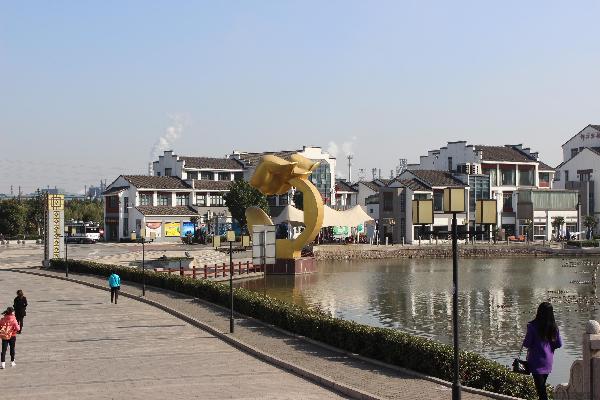| 
Yonglian Village gets a makeover after years of pollution
The newly-revised Environmental Protection Law went into effect from January 1, 2015. The law gives harsher punishments to environmental wrongdoing, and has specific provisions on tackling smog, making citizens more aware of environmental protection and protecting whistleblowers.
Jiangsu Yonggang Group Co. Ltd., as a traditional heavy polluter, is under increasing pressure to protect the environment. The iron and steel enterprise is located in Zhangjiagang City, Jiangsu Province. The majority of Yonglian villagers live in the town a few km away. Environmental protection measures concern the health and safety of more than 10,900 villagers and over 10,000 workers.
Peng Xiyuan, Director of the steel group's Environmental Protection Department, recalled an incident in the past when villagers complained to the local environmental protection authority that the group's plant was discharging pollutants. However, field investigation showed the emissions were as per the prescribed national standard for effluents. Yet, Peng said, the group decided to put villagers' minds at peace by demolishing 16 chimneys and spending 10.5 million yuan ($1.72 million) to purchase equipment to condense the discharged steam.
"At that time we were severely criticized for spending so much money on equipment when we had already met the standards," he said. "But we had the best interests of people at heart."
Garden factory
The steel group is endeavoring to change the image of industry as a heavy polluter. Energy conservation and environmental protection have become an important part of the group's industrial upgrading. In 2013, it laid out a three-year development goal to transform itself into a "garden factory" - a green factory contributing to public welfare.
At the company, any environmental mishap is immediately investigated to track down the staff responsible. Nearly a dozen cameras have been installed to monitor smoke and dust emissions. "At the factory, environmental protection is as important as safety," Peng stressed.
The total output value of the steel group reached 35.5 billion yuan ($5.8 billion) in 2013, with a profit of 790 million yuan ($129.5 million). The total profits were estimated to reach 1 billion yuan ($164 million) in 2014. Since 2013, the group has invested 1 billion yuan ($164 million) in the upgrade and reconstruction of environmental protection facilities, so that it could become a "garden factory."
All solid materials are transported in pipelines. The factory now is using a windbreak wall around the solid materials at the dumping site to control the dissemination of fugitive dust. Peng said the factory invested 60 million yuan ($9.83 million) in its rainwater and sewage shunt project, a leading technology in the industry that distinguishes it from other enterprises nearby which don't have such advanced facilities.
Making waste profitable
The Ministry of Industry and Information Technology (MIIT) in July 2014 came up with a list of production lines and facilities that must be withdrawn to phase out backward production capacity in the iron and steel industry. The list covers 44 iron makers and 30 steel manufacturers, targeting to reduce iron-smelting capacity by 19 million tons and steel smelting capacity by 28.7 million tons. The Yonggang group was not on the list.
The concept of energy saving and low-carbon emission is well reflected in the company's treatment system for solid, liquid and gaseous waste. Wastewater generated in the process of iron and steel making is purified by wastewater treatment plants, sludge compressed will be used for the adhesives in the industrial production, and recycled water will be used as process water. At present, water reuse rate of the steel group has reached 99 percent, or nearly zero emissions.
Carbon monoxide may also be recycled as fuel for sintering in the steel rolling workshop. The pressure and heat in the blast furnace is used to run a generator. The group's self-generating electricity ratio now stands at 46 percent, which means saving 900 million yuan ($147.5 million) in electricity costs annually.
There is a slag-processing workshop which separates iron particles from the sludge. While the iron is recycled, the remnant is used to make bricks. Yonglian Village is paved with bricks made of compressed slag. The group claims a 100-percent slag recycling rate. "All the wastes are being transformed into recyclable resources," Peng said.
The recovery and utilization rate of waste heat in the iron and steel industry remains low - at about 30 to 50 percent for large enterprises - as waste heat treatment is expensive. The Yonggang group has improved its resource recycling by using the high-pressure steam generated for power generation and the lower-pressure category for agriculture development.
"Circular economy has turned the Yonggang group into a garden," remarked Wu Dongcai. "It implemented internal recycling and made industrial and agricultural cycles overlap. This has improved conditions for the village's comprehensive, coordinated and sustainable development and effected urban-rural integration."
|